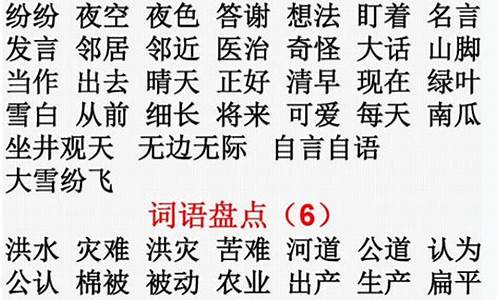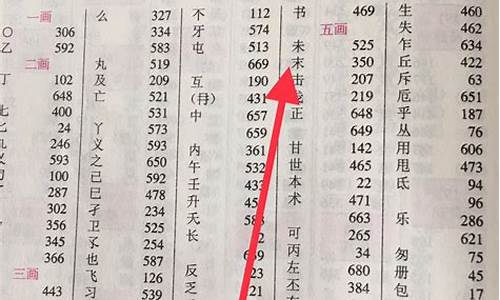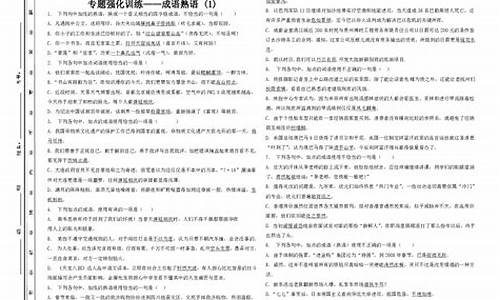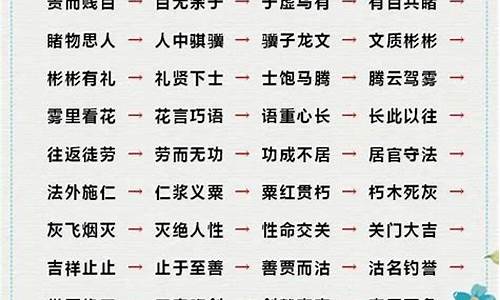您现在的位置是: 首页 > 成语用法大全 成语用法大全
用英语介绍中国的一个四个字的成语故事_用英语介绍中国的一个四个字的成语故事作文
ysladmin 2024-06-14 人已围观
简介用英语介绍中国的一个四个字的成语故事_用英语介绍中国的一个四个字的成语故事作文 大家好,今天我来和大家聊一聊关于用英语介绍中国的一个四个字的成语故事的问题。在接下来的内容中,我会将我所了解的信息进行归纳整理,并与大家分享,让我们一起来看看
大家好,今天我来和大家聊一聊关于用英语介绍中国的一个四个字的成语故事的问题。在接下来的内容中,我会将我所了解的信息进行归纳整理,并与大家分享,让我们一起来看看吧。
1.用英文介绍铁杵磨针的故事
2.谁能提供十篇以上英语成语小故事
3.以下4个成语有无意思相近的英语成语或者习语?同时请简单用英语讲述下下面4个成语的英语故事,谢谢!
4.用英语向外国人介绍“同舟共济”这个成语的故事,100词左右。
5.反映中国传统文化的成语 历史经典故事 民间传说的英文材料
6.用英语简写一个中国成语故事(提示:要有记述文的要素,When…?Where…?Who…?What…

用英文介绍铁杵磨针的故事
『壹』 铁杵磨针的启示“铁杵磨针”启示:
1、只要坚持不懈就算是铁杵,也能磨成针。
2、一个人,不管结果如何,只要坚持不懈,即可创佳绩。
3、目标专一而不三心二意,持之以恒而不半途而废,就一定能实现我们美好的理想。
无论做什么事情,只要有恒心,一定会成功的,功夫不负有心人。我们的孩子们,如果在学业上能认真、努力、有恒心,成绩好一定是没有问题的.重视生活中的细节,那将影响你的一生.请牢记:世上没有做不到的事,关键在于你的态度。
(1)用英文介绍铁杵磨针的故事扩展阅读:
铁杵磨针(tiě chǔ mó zhēn )是一个成语,比喻只要有决心,肯下工夫,多么难的事情也能做成功。是褒义词,可做谓语、宾语、定语、状语。
出自南宋祝穆《方舆胜览》:“过小溪,逢老媪方磨铁杵,问之,曰:' 欲作针。' ”
翻译:路过小溪,遇见一个老人在磨铁杵,便去问她,她说“想要磨成针。”
典故:说的是大诗人李白小时候读书不顺,弃学途中偶遇一老妇人用铁杵磨针,对自己的触动很大,终于发奋读书,最终学有大成。“只要功夫深,铁杵磨成针”就出自这个故事,这句话也成为激励后人持之以恒求学的名言警句。
『贰』 中国成语故事《铁杵磨针》
铁杵成针
[读音][tiě chǔ chéng zhēn]
[解释]比喻只要有毅力,肯下苦功,事情就能成功。
[出处]明·郑之珍《目连救母·四·刘氏斋尼》:“好似铁杵磨针;心坚杵有成针日。”
[近义]铁杵磨针愚公移山持之以恒铁杵磨成针
[反义]半途而废
『叁』 铁杵磨针的故事/
唐朝著名大诗人李白小时候不喜欢念书,常常逃学,到街上去闲逛。 一天,李白又没有去上学,在街上东溜溜、西看看,不知不觉到了城外。暖和的阳光、欢快的小鸟、随风摇摆的花草使李白感叹不已,“这么好的天气,如果整天在屋里读书多没意思?”
走着走着,在一个破茅屋门口,坐着一个满头白发的老婆婆,正在磨一根棍子般粗的铁杵。李白走过去,“老婆婆,您在做什么?”
“我要把这根铁杵磨成一个绣花针。”
老婆婆抬起头,对李白笑了笑,接着又低下头继续磨着。
“绣花针?”李白又问:“是缝衣服用的绣花针吗?”
“当然!”
“可是,铁杵这么粗,什么时候能磨成细细的绣花针呢?”
老婆婆反问李白:“滴水可以穿石,愚公可以移山,铁杵为什么不能磨成绣花针呢?”
“可是,您的年纪这么大了?”
“只要我下的功夫比别人深,没有做不到的事情。”
老婆婆的一番话,令李白很惭愧,于是回去之后,再没有逃过学。每天的学习也特别用功,终于成了名垂千古的诗仙。
无论做什么事情,只要有恒心,一定会成功的,功夫不负有心人。我们的孩子们,如果在学业上能认真、努力、有恒心,成绩好一定是没有问题的.重视生活中的细节,那将影响你的一生.请牢记:世上没有做不到的事,关键在于你的态度。
『肆』 铁杵磨针故事内涵是什么啊
只要有决心,肯下工夫,多么难的事情也能做成功。
『伍』 成语故事《铁杵磨针》
成语: 铁杵磨成针
拼音: tiě chǔ mó chéng zhēn解释: 杵:舂米或捶衣用的棒。将铁棒磨成细针。比喻只要有恒心,肯努力,做任何事情都能成功。
成语故事:
唐代大诗人李白,小的时候很贪玩,不爱学习。他的父亲为了让他成材,就把他送到学堂去读书,可是,那些经史、诸子百家的书很不好学,李白学起来很困难,就更加不愿意学了,有的时候还偷偷跑出学堂去玩。
有一天,李白没有上学,跑到一条小河边去玩。忽然他看见一位白发苍苍的老婆婆蹲在小河边的一块磨石旁,一下一下地磨着一根铁棍。
李白好奇地来到老婆婆身边,问道:“老婆婆,您在干什么?”“我在磨针。”老婆婆没有抬头,她一边磨一边回答。
“磨针!用这么粗的铁棍磨成细细的绣花针。这什么时候能磨成啊!”李白脱口而出。而老婆婆这时抬起头,停下手,亲切地对李白说:“孩子,铁棒虽粗,可挡不住我天天磨,滴水能穿石,难道铁棒就不能磨成针吗?”
李白听了老婆婆的话,很受感动。心想:“是呀,做事只要有恒心,不怕困难,天天坚持做,什么事都能做好。读书不也是一样吗?”李白转身跑回学堂。
从此以后,他刻苦读书,历代诗词歌赋,诸子百家,他见到就读,终于成为一名著名的诗人。
这句成语比喻只要长期努力不懈,再难的事也能成功。
『陆』 铁杵成针的故事
故事讲的是李白小的时候很聪明,贪玩、不好学。一天,他趁人没注意,丢下书本,溜出去玩。他四处闲逛,走啊走啊,不知不觉,来到一条小溪边,有位白发苍苍的老婆婆正在溪边吃力的磨着铁杵。
李白觉的很奇怪,上前问到:“老婆婆您在干什么?”老婆婆说:“我要把铁杵磨成绣花针。”李白吃了一惊问:“这个铁杵几年才能磨完?”老婆婆说“只要功夫深,铁杵就能磨成绣花针。”李白听了从此刻苦学习、仔细观察,成了中国一位大诗人。
《铁杵成针》的故事告诉我们不管做什么事,只要认真去做都能成功。
:铁杵成针:[ tiě chǔ chéng zhēn ]
详细解释
1.解释:比喻只要有毅力,肯下苦功,事情就能成功。
2.出自:明·郑之珍《目连救母·四·刘氏斋尼》:“好似铁杵磨针,心坚杵有成针日。”
3.例句:王明同学虽然伤残无手臂,但是他却能用双脚书写,并获儿童书法奖。他是靠锲而不舍的努力,才使~的。
『柒』 铁杵磨针这成语故事的主角是谁
铁杵磨针这成语故抄事的主角是白发苍苍的老婆婆.
成语: 铁杵磨针
拼音: tiě chǔ mó zhēn
解释: 铁杵:铁棍。铁棍子磨成绣花针。比喻只要有恒心,肯努力,做任何事情都能成功。
出处: 明·郑之珍《目连救母·刘氏斋尼》:“好似铁杵磨针,心坚杵有成针日。”
举例造句: 那南方中的举人进士,不知费了先生多少掏成,多少指点,铁杵磨针,才成正果。 《醒世姻缘》第25回
拼音代码: tcmz
近义词: 铁杵磨成针、铁杵成针
用法: 作宾语、定语;用于劝诫人
故事: 唐朝著名诗人李白小时候从不认真读书,经常是把书本一抛就出去玩耍。一天李白碰到一个白发苍苍的老婆婆正拿着一根大铁棒在石头上磨,觉得好奇问她做什么,老婆婆告诉他要磨成绣花针,李白深受感动,从此就用功读书,终于成为文豪.
『捌』 铁杵磨成针的故事
原抄文:磨针溪,在眉州象耳山下袭。世传李太白读书山中,未成,弃去。过小溪,逢老媪方磨铁杵,白怪而问之,媪曰:“欲做针。”白曰:“铁杵成针,得乎?”曰:“但需工深!”太白感其意,还而终业。媪自言姓武,今溪旁有武氏岩。
译文:磨针溪在眉州象耳山下。世间相传李太白在山中读书,还没有读完,就放弃离去了。过了小溪,看见一位老婆婆正在磨铁杵,李白感到奇怪便问她,老婆婆回答:“我想要做针。”李太白问道:“铁杵磨成针,能行吗?”老婆婆答道:“只需功夫深!”李白被她的毅力(意志)所感动,就回到了山上完成学业。老婆婆自己说她姓武,现在磨针溪旁有武氏岩。
新义
从表面上看,这个成语是褒义的。但仔细想想,将一个铁杵磨成一根绣花针,这不明显是浪费吗?既浪费了一根铁杵,又浪费了宝贵的时间,何况对于一个老太太来说?持之以恒的毅力固然可贵,重要。但也要注重一个“效率”啊。
谁能提供十篇以上英语成语小故事
守株待兔
One day a farmer was working in the field .
suddenly a hare carched
into a tree ,it fell to the
ground and died.The
farmer was happy.
He took it back home
and cooked it.from the
on ,the farmer stopped
working.And waited for
another hare.But another hare never come.So the farmer had
nothing to eat.
以下4个成语有无意思相近的英语成语或者习语?同时请简单用英语讲述下下面4个成语的英语故事,谢谢!
天衣无缝
one summer night, when the moon was very bright he suddenly saw a girl descending(下降) slowly from the sky. he observed the girl closely, and found that the dress she was wearing was seamless(无缝的) . he was puzzled, and asked why. the girl answered,"heavenly clothes are not sewn with needle and thread."
传说古代太原人郭翰在夏夜里乘凉,见一个仙女从天上下来,她身穿白衣,美丽绝伦。她告诉他她名叫织女。郭翰仔细欣赏织女的衣裳浑然一体,竟看不出一丝线缝,好奇问织女。织女答道:“天衣本非针线为也。”
this idiom is used metaphorically to indicate the flawless handling of things. it can also be used to indicate a perfectly written poem or other literary article.
神话传说,仙女的衣服没有衣缝。比喻事物周密完善,找不出什么毛病。
对牛弹琴
Gong Mingyi was a famous musician in ancient times, who played the lute very well.
公明仪是古代一位很有名的音乐家,弹得一手好琴。
One day, while playing the lute indoors, Gong Mingyi saw a cow eating grass leisurely outside the window. He had a sudden whim to play some melodies for the cow. He first played the "Exercise of Qing Jiao", but the cow still kept on eating grass with head lowered. He seemed to realize that the melody was too highbrow for the cow to understand.
有一天,他在室内弹琴,看见一头牛在窗外悠闲地吃着草。他忽然想弹几曲给牛听听。他先弹了一曲“清角之操”。可是,牛还是跟刚才一样,只顾低着头吃草。他似乎意识到,这支曲子太高雅了,牛没有听懂。
So he played several other melodies, imitating the buzzing sounds of swarms of flying mosquitoes, and the bleats of a calf looking for its companions. At this, to his surprise, the cow stopped eating grass, but raised its head, pricked up its ears, wagged its tail and, pacing up and down in small steps, began to listen attentively.
于是,他弹了另外几支曲子,模拟蚊子成群结队飞来飞去的嗡嗡声;模拟小牛犊寻找伙伴的眸眸叫唤声。这样一来,这头牛竟然不吃草了,抬起头,竖着耳朵,甩着尾巴,迈着小步,留心地倾听起来。
用英语向外国人介绍“同舟共济”这个成语的故事,100词左右。
英语成语故事:高山流水
发表时间:2010-12-31内容来源:VOA英语学习网
During the Spring and Autumn Period(770-476B.C.).there was a man whose name was Yu Boya.Yu boya famous music master at that time, having a good command of the temperament and superb skills in playing the musical instrument.He was bright and eager to learn when he was young.He had formally acknowledged several experts as his teachers,and his skills in playing the musical instrument had already reached a fairly high level.But he still felt that he could not superbly express the various things which had deeply impressed him.Knowing what was in his mind,his teacher took him to the penglai Island,a fabled abode of immortals,on the East China Sea by boat.On the island,his teacher let him enjoy the natural scenarios and listen to the roaring of the great waves.looking into the distance,Boya saw that the waves were turbulent and that the white breakers leapt skywards.Sea birds were circling in the air,and their crying was very pleasant to the ear.Trees were green and intriguing feeling welled up in his mind,as if he had heard the harmonious and charming music of nature.He couldn't help taking his musical instrument and playing it .He followed his inclinations while he was playing,and incorporated the beautiful nature with his music,thus reaching a realm of thought he had never experienced before.Seeing this,the teacher said to hime,''You have mastered the art of playing."
Once,on the 15th day of the 8th lunar month,he was boating for sight-seeing.The moon was bright and a cool breeze was blowing gently.With myriads of thoughts welling up in his mind,he began to play the musical instrument.The melodious music became more and more beautiful when a man on the bank shouted "bravo!"Hearing the shouting,Boya came out of the boat,and saw a woodcutter standing on the bank.He knew that this man was keenly appreciative of his talents,because he understood his music.He immediately invited the woodcutter to his boat and ,full of zest,he played the musical instrument for him.When Boya played a piece of music eulogizing the high mountains,the woodcutter said,"wonderful!The melody is as magnificent and dignified as Mount Tai which reaches to the sky!"When he played a piece of music depicting the turbulent waves,the woodcutter said,"Wonderful!The melody is as vast and mighty as the great rivers!"Boya was excited,and siad,"Bosom friend!You are really my bosom friend!"That woodcutter was Zhong Ziqi.Since then,they had been very good friends.
This story appears in The Works of Lie Zi.From this story,people havederived the set phrase"high mountain and running water" to refer to understanding and appreciative friends.This set phrase is also used to refer to melodious music.
春秋时代,有个叫俞伯牙的人,精通音律,琴艺高超,是当时著名的琴师。俞伯牙年轻的时候聪颖好学,曾拜高人为师,琴技达到水平,但他总觉得自己还不能出神入化地表现对各种事物的感受。伯牙的老师知道他的想法后,就带他乘船到东海的蓬莱岛上,让他欣赏大自然的景色,倾听大海的波涛声。伯牙举目眺望,只见波浪汹涌,浪花激溅;海鸟翻飞,鸣声入耳;山林树木,郁郁葱葱,如入仙境一般。一种奇妙的感觉油然而生,耳边仿佛咯起了大自然那和谐动听的音乐。他情不自禁地取琴弹奏,音随意转,把大自然的美妙融进了琴声,伯牙体验到一种前所未有的境界。老师告诉他:“你已经学了。”
一夜伯牙乘船游览。面对清风明月,他思绪万千,于是又弹起琴来,琴声悠扬,渐入佳境。忽听岸上有人叫绝。伯牙闻声走出船来,只见一个樵夫站在岸边,他知道此人是知音当即请樵夫上船,兴致勃勃地为他演奏。伯牙弹起赞美高山的曲调,樵夫说道:“真好!雄伟而庄重,好像高耸入云的泰山一样!”当他弹奏表现奔腾澎湃的波涛时,樵夫又说:“真好!宽广浩荡,好像看见滚滚的流水,无边的大海一般!”伯牙兴奋色了,激动地说:“知音!你真是我的知音。”这个樵夫就是钟子期。从此二人成了非常要好的朋友。
故事出自《列子·汤问》。成语“高山流水”,比喻知己或知音,也比喻音乐优美。
英语小故事:卧薪尝胆
During the Spring and Autumn period (770-476BC), the State of Wu launched an attack against the State of Yue. The King of Wu was seriously wounded and soon died. His son Fu Chai became the new King. Fu was determined to get revenge. He drilled his army rigidly until it was a perfect fighting force. Three years later, he led his army against the State of Yue and caught its king Gou Jian. Fu took him to the State of Wu.
In order to avenge his father’s death, Fu let him live in a shabby stone house by his father’s tomb and ordered him to raise horses for him. Gou pretended to be loyal to Fu but he never forgot his humiliation. Many years later, he was set free. Gou secretly accumulated a military force after he went back to his own state. In order to make himself tougher he slept on firewood and ate a gall-bladder (苦胆) before having dinner and going to bed every night.
At the same time he administered his state carefully, developing agriculture and educating the people. After a few years, his country became strong. Then Gou seized a favorable opportunity to wipe out the State of Wu.
Later, people use it to describe one who endures self-imposed hardships to strengthen one’s resolve to realize one’s ambition.
人们用“卧薪尝胆”来形容人刻苦自励以达到自己定下的目标
反映中国传统文化的成语 历史经典故事 民间传说的英文材料
Spring and Autumn Period, Wu and Yue States often fight each other. Between the two countries will also be other people as enemies. On one occasion, two people who happen to take a boat to cross the river together. Just ship, they stared at each other on board the other side, like the one to fight. But the ships to the river when the storm suddenly encountered, vessels should be turned over to see, in order to save lives, they gave each other's hatred, have mutual aid, and the stability of the hull together, only to escape this natural disaster, while the other side of the river to reach safety.
用英语简写一个中国成语故事(提示:要有记述文的要素,When…?Where…?Who…?What…
姜太公钓鱼
A Willing Victim Letting Himself Be Caught
The story happened around 3000 years ago. There was a wise man named Jiang Ziya living in a village near the Weishui River. He often went fishing at the Weishui River, but he would fish in an unusual way. He hung a straight fishhook, without bait, there feet above the water One day a farmer named Wu Ji went to the river, and saw the strange way of fishing by Ji He laughed and said, “How stupid it is to even think about fishing this way, how many fishes can you get?” Jiang Ziya replied,” lf a fish doesn’t want to live any more, it will come and swallow \the hook itself.” Soon his strange way of fishing was reported to Ji Chang, the Count of the feudal estate .Ji Chang was very interested, and went to visit Jiang personally. Soon they became great friends as Ji Chang realized that Jiang might be a great talent. He invited Jiang to work for him .Jiang helped Ji Chang and his son turn over the Shang Dynasty and establish the Zhou Dynasty. Jiang was given the title of Taigong, so people called him ’’Jiang Taigong.” Today, people use this old idiom “A willing victim Letting Himself Be Caught” to describe someone who willingly falls in a trap or does something regardless of the result.
毛遂自荐
Mao Sui Recommended Himself
In the Warring States Period ,the king of Zhao planned to ask the King of the State of Chu to resist Qin’s attacks together .He sent Pingyuan to Chu convince their king Before Pingyuan left ,a man called Mao Sui showed up ,volunteered to go with him .Pingyuan said ,”I haven’t heard that you have any special abilities ,so what help can you do over there ?” Mao Sui said ,”You put me in a bag ,and my special abilities will stick out like an awl .” So Pingyuan agreed to take Mao Sui to the State of Chu .The negotiations between the two states lasted from morning to noon ,and still couldn’t come to a conclusion. At this time Mao Sui came up and said ,”Chu is a state big enough to rule the world .However ,you are so afraid of Qin. It is such a shame that we Zhao people are embarrassed by you .Now we ask you to combine our troops , but you are acting like a coward !” The king of Chu felt ashamed after Mao Sui’s passionate words .He finally agreed to send troops tp fight Qin . This idiom describes the courage of self –recommending by people with great abilities .
对牛弹琴
Playing the Lute to a Cow
Once upon a time ,there was a man who played the lute very wellOne day ,he played a tune in front of a cow ,hoping that the cow would appreciate it .The tune was melodious ,but the cow showed no reaction ,and just kept on eating grass. The man sighed ,and went away . This idiom is used to mock the idea of reasoning with stupid people or talking to the wrong audience .
求四个字的成语故事英语的
百度阅读2.0全新发布,更新有礼
好书全免费,You can you up
手机网页游戏 1 宫廷计 3 好玩的单机游 5 艳阳天酒店 2 单机游戏 4 免费单机游戏 6
阅读人数:1465人 页数:3页
An official of the ancient State of Chu awarded a pot of wine to his men after the ceremony of Spring Sacrifice. One man said, “We have only one pot of wine. It's not enough for all of us but sufficient for one. Let's determine who'll have the wine by drawing a snake on the ground. He who finishes first will have the wine.”
The others agreed. Very soon, one man finished his snake. He was about to drink the wine when he saw the others were still busy drawing. He said complacently,“How slowly you are! I still have enough time to add feet to my snke.” But before he finished the feet, another man finished his snke and grabbed the pot from him, saying,“Whoever has seen a snake with feet? Yours is not a snke. So the wine should be mine!” He drank the wine. The man adding the feet to the snake had to give in and could only regret his foolishness.
From that story comes the idiom “Draw a snake and add feet to it”。 Now people use this idiom to illustrate the truth that going too far is as bad as not going far enough.
译文:
楚国有一个官员,在春天祭过了 祖宗之后,便将一壶酒赏给他的办事 人员喝。有人提议:“我们只有一壶 酒,肯定不够我们大家喝的,一个人 喝倒是绰绰有余。我们每人在地上画 一条蛇,谁画得最快,就把这壶酒给 他。” 大家都同意了。
有一个人很快就把蛇画好了。他 正打算喝这壶酒时,看见别人都还忙 着画呢。他就得意扬扬地说:“你们画 得好慢呀,等我再画上几只脚吧!” 他的蛇脚还没画完,另一个人已经把 蛇画好了。那人把酒壶夺了过去 说:“有谁见过长脚的蛇?你画的不是 蛇,这壶酒应该是我的了。”说罢,就 喝起酒来。那个给蛇画脚的人没办 法,只能懊悔自己的愚蠢。
“画蛇添足”这个成语就是从这个 故事来的。现在人们用它来说明这么 个道理:做的过分和做的不够是一样 有害的。
英语故事:破镜重圆
A Broken Mirror Joined Together
This set phrase metaphorically means the reunion of husband and wife after an enforced separation or a rupture.
At the end of Southern Dynasties,when the Chen Dynasty was about to be overthrown.
Xú Déyán felt very worried.He foreknew that his wife Princess Lè Chāng was destined to separate from him.
His wife is the last Emperor Chén Shūbǎo's younger sister.
Hence he broke a round bronze mirror into halves.
One half is given to the Princess,the other half left with himself.
The couple agreed on it that the wife would pretend to sell the broked mirror in the street of Cháng'ān,the capital of the Suí Dynasty,on the Lantern Festival.
After the fall of Chén Dynasty,Princess Lè Chāng was captured and sent to Chang'an and forced to be a concubine-servant in the mansion of Yáng Sù.
Xú Déyán missed his wife very much and went to the captial to look for her.
On the 15th day of the first lunar month,he found a man selling half the mirror.
After asking the man,he knew that his wife had been a concubine-servant of Yáng Sù. Thinking that he could not see her again,he sighed a great sorrow.
Having known the matter,Yáng Sù felt much sympathy for the couple.He sent for Xú Déyán and told him to take wife away.Thus the husband and the wife were reunited into a happy couple.
好了,今天关于“用英语介绍中国的一个四个字的成语故事”的话题就讲到这里了。希望大家能够对“用英语介绍中国的一个四个字的成语故事”有更深入的认识,并从我的回答中得到一些启示。如果您有任何问题或需要进一步的信息,请随时告诉我。
下一篇:语字的成语大全_语字的成语大全集









